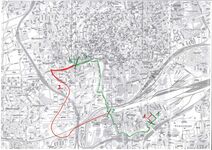
Navigation of Cyclists - New Target Groups of Traffic Management

In the context of increasing environmental harm or, conversely, to improve the quality of life in cities, bicycle mobility is becoming more and more important. This is supported by the availability of e-bikes, which can be used to attract completely new target groups of cyclists. At the same time, the increasing bicycle electrification and broader use of smart phones will increase the use of navigation support. Finally, this will make cyclists a new target group for traffic management.
The aim of this work is to develop approaches in order to provide cyclists with relevant navigation information and to investigate to what extent their behaviour can be changed according to the goals of a central traffic management. The most practical ergonomic question hereby is how navigation information should be conveyed safely on the bicycle (minimizing distraction, maximizing intelligibility on complex routes). The psychological question contains further which criteria for cyclists are decisive for the route choice. Avoiding gradients, traffic lights, or stopping could be just some of the aspects that are important here. On the one hand the work examines the relevant criteria of the route choice of cyclists, on the other hand the possibilities of navigation support. All in all, this work contributes to expanding the possibilities of traffic management, with a better understanding of the basics of cyclist behaviour on the psychological side.
Researcher: Susanne Grüner, M. Sc.